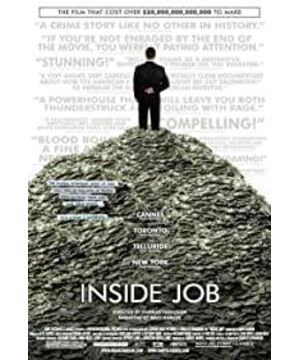The film uses the Icelandic financial crisis as a prelude, standing on the public's standpoint, and expounding the ins and outs of the financial crisis in an approachable manner to audiences without professional backgrounds, but it is also a clear standpoint that the creators are common in the literary and artistic circles.
After the Great Depression, the U.S. financial industry was strictly regulated. It was not until the Reagan administration in the 1980s that the Reagan administration began to fully deregulate the financial industry. The film did not explain why the Reagan administration did this. The reason was the US economic downturn during the predecessor's Carter era. The Reagan administration's easing policies greatly helped the recovery of the US economy. I think this current situation should be recognized. In fact, Reagan is also one of the most popular among the American presidents.
Subsequently, "Guardian Steal" proposed that in the absence of supervision, greedy Wall Street designed one after another money-rolling game, which eventually led to the occurrence of a crisis. However, greed is not illegal. Wall Street is greedy at all times. This is normal. This is the essence of capitalism. I personally think that it is one-sided to blame the financial crisis on subprime mortgages or Wall Street greed. In fact, the subprime mortgage is the original intention of the U.S. government to improve the housing conditions of low-income families. The loans issued by the two companies, Freddie Mac and Fanle Mae, are in fact a type of loan affected by government policies. The debtors of these loans are indeed unreliable and there is a risk of bad debts, but after all, as long as the lenders are aware of risk control and supported by the government, the consequences will be controllable.
The real culprit is the separation of power and responsibility. The decision right to issue bonds is separated from the providers of debt funds by Wall Street. Whether to give individual loans or not is determined by the bank. Then Wall Street packs up these debts and sells them to investment banks. The investment banks break down the debts, upgrade them, and sell them to individual investors. So, in essence, it is the bank loan that goes out and individual investors contribute capital to support this debt. (For the specific details, please refer to the comment of "Big Short" linked at the end of the article.) The
second major factor is the issue of the pricing mechanism, that is, the model used has incorrect assumptions. If the pricing is correct, no matter how the intermediate chain is passed, it is fair. Unfortunately, the pricing was wrong in the first step. In fact, the biggest beneficiaries are those poor people who have no money to buy a house and can borrow money to buy a house, and the low interest rate of the whole society, the biggest loss is the last investor. But the buyers are all Americans, and the investors have many foreigners. So for the United States, Wall Street has done a good thing. AIG is one of the victims of mispricing. If every transaction is fair, then AIG will not issue so many CDSs that are not correctly valued, and there will be no problem with the ratings of the rating agencies. Investors will find that the AAA bond they buy is not actually AAA. This investment bank Nor is it intentional.
"Guardian Self-Stealing" also accused experts and scholars of accepting remuneration to write reports that are beneficial to those who paid the remuneration, and that the rating agencies ignoring their conscience gave these bad securities AAA ratings. Experts and scholars report that collecting money is originally the relationship between labor and remuneration. Even if the problematic consumption is their own reputation, I don't think there is any problem. As for rating agencies, their culture is credibility and credibility. They don’t dare to take risks with their credibility, and there is not much benefit to them. If there is a problem, their reputation is discredited; the main reason is that they don’t know how this thing should be. Evaluation has to be based on historical data. If you can’t set the price correctly, you will classify the person as an AAA, not because of moral decay, but mainly because you don’t understand. Taking a step back, the ratings of rating agencies are also recommendations, and they are not legally effective. Keeping one's eyes open is the ultimate responsibility of investors.
Then, "Guardian Steal" also pointed out that the rescue authorities headed by Paulson insisted on asking Lehman Brothers to go bankrupt, which is completely contrary to the previous attitude of taking over the two houses and asking the Federal Reserve to provide 30 billion US dollars to guarantee JPMorgan Chase's acquisition of Bear Stearns. This makes the whole world The panic in the market is unprecedentedly magnified, and it seems that the loss is to be passed on to investors all over the world. After that, they used taxpayer money to rescue AIG and made Goldman Sachs, which holds the CDS sold by AIG, a profit of 14 billion yuan. The facts are not so simple. The movie "Big But Not Falling" mainly describes this process. Please refer to my review of this movie, and there is a link at the end of the article.
next charge is that after Obama, who promised to "change", he took office, the reform and supervision of financial institutions have progressed slowly. The culprit of the financial crisis". Then all these people refused to interview. First of all, it has been explained above that the financial crisis was not caused by them, and "Big But Not Down" also tells us that they did not engage in conspiracy in the rescue process. Secondly, these people are the experts who know finance best. Don't you use them, use Matt Dimon? Refusal to interview is also a personal freedom. The film’s position is so clear that they must be convicted, so why bother to be as boring as the author of the money and banking textbook in the film?
There is another issue, the salary of bank executives. Compensation includes wages and dividends, which are linked to the operating conditions of the company. You can't get back their previous salary just because these institutions have done these things. And the legislature seems to have no basis to restrict the salary of employees in an industry, because this is based on their high profits. What they should do is to limit illegal business practices and conflicts of interest that can lead to crises.
In fact, after talking for a long time, the root cause of this crisis is not Wall Street greed, nor is it that rating agencies and academics are helping to abuse it, nor is it a conspiracy by the authorities, but two things: the separation of rights and responsibilities, and mispricing. The former led to the loan of money to those who shouldn't, causing losses; and the problem of incorrect pricing led to the distribution of this loss among investors and institutions in various links. After all, it is Wall Street’s responsibility, but not as described in this film. I also have principles when washing the floor.
The American point of view is very free. Because of the huge influence of Hollywood literary and artistic circles in the public, coupled with the people's natural aversion to Wall Street, views such as "Guardian and Pirate" can easily gain support. Those on Wall Street are treacherous and cunning, but they are not against the law. It's just that the pricing mechanism and fairness of the transaction mechanism are not perfect. The party with insufficient information and the dumb party will definitely lose money in the transaction. After everyone loses money, the collapse of the financial system has little to do with the subprime mortgage crisis. No matter what kind of financial crisis, it is a crisis of liquidity and credibility in the end, and any cause can be possible.
Therefore, for ordinary people, the biggest revelation is not to occupy Wall Street, but to do not understand things. Don't participate lightly.
Related articles:
"Big Short"-first tell you how good the movie is, and then you will ask and answer
"Big But Not Down"-from the perspective of non-literary and artistic circles.
WeChat public account: Fat Dudu to watch movies (feidudumovie)
View more about Inside Job reviews










